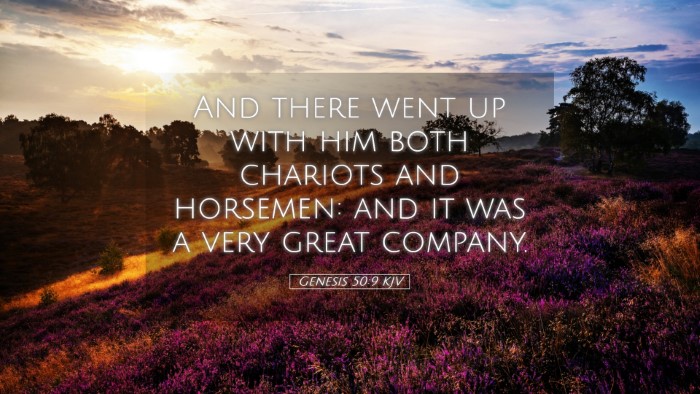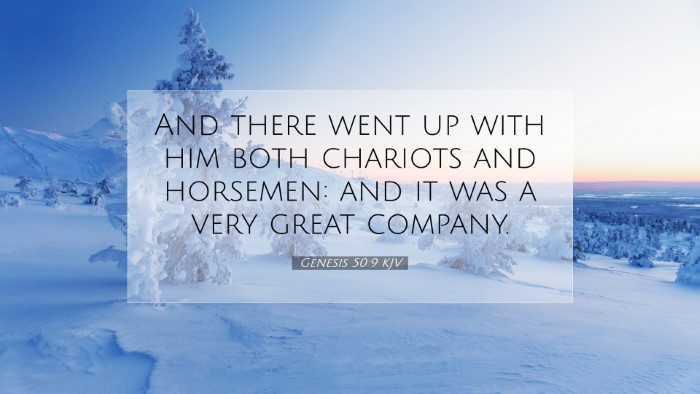Bible Commentary on Genesis 50:9
Genesis 50:9 reads: "And there went up with him both chariots and horsemen: and it was a very great company." This verse concludes the narrative surrounding the death of Jacob and sets the stage for the burial proceedings that take place in Canaan. A closer examination reveals several layers of meaning and significance that hold value for pastors, theologians, and scholars.
Overview of Genesis 50:9
This verse captures the grandeur of the procession that accompanied Joseph as he took his father's body back to Canaan for burial. The mention of "chariots and horsemen" implies both wealth and honor, suggesting that Jacob's death was an event of considerable significance.
Insights from Public Domain Commentaries
Matthew Henry
Respect and Honor: Henry notes that the large company indicates the respect that was afforded to Jacob as a patriarch and leader of the family. The royal treatment in which Joseph conducted the burial signifies the high esteem in which Jacob was held by both his family and the Egyptians.
Symbolism of Chariots: Henry also emphasizes the role of chariots in the ancient world, viewing them as symbols of power and military strength. This demonstrates that Joseph, even though he was in a position of authority, remained humble and honored his father appropriately.
Albert Barnes
Encouragement in Mourning: Barnes elaborates on the cultural context in which such funerals were conducted. The great company indicates not only Joseph’s personal grief but also the collective mourning of the Egyptians, who recognized Jacob’s significance. He argues that this act of mourning serves as a reminder of the bonds between families and nations.
Fulfillment of Promises: Barnes points out that the journey to Canaan fulfilled God’s promises regarding the land. Joseph’s journey signifies not only a literal return but also a spiritual return to the land God had promised to Abraham, Isaac, and Jacob.
Adam Clarke
Divine Providence: Clarke focuses on the divine orchestration of events. He implies that the grandeur of the procession is indicative of God's providence in elevating Joseph to a position of influence in Egypt. This elevated status allowed him the means to honor his father in such a spectacular way.
Lessons on Leadership and Responsibility: Clarke emphasizes that Joseph’s actions exemplify the responsibility leaders have to their families and heritage. He portrays a model for leaders today to take their familial responsibilities seriously and to honor their predecessors.
Theological Reflections
This verse challenges readers to reflect on the themes of honor, legacy, and divine providence. It encourages a deeper understanding of how familial respect and responsibility intertwine with personal faith and leadership. Here are some key reflections:
- The Importance of Family: The unity and care exhibited in this narrative highlight the importance of family and community during times of mourning.
- Divine Sovereignty: The visible blessing on Israel's family, culminating in Joseph's influence in Egypt, demonstrates God’s fidelity to His promises.
- Preparing for Transition: The funeral procession reminds leaders and believers alike of the inevitability of transitions in life and the importance of legacy.
Practical Applications
For pastors and leaders, Genesis 50:9 reminds us of the importance of honor and respect within our own families and communities. It calls for practical applications in congregational life:
- Encouraging Mourning Together: Just as the Egyptians joined in mourning Jacob, churches should encourage communal support during times of loss and grief.
- Honoring Our Heritage: Establish rituals and practices that honor the legacy of previous generations within the church.
- Recognizing Divine Guidance: Leaders should remain attuned to God’s providential hand in their lives and decisions, fostering a spirit of humility and gratitude.
Conclusion
Genesis 50:9 serves as a powerful testament to the value of honoring family and the significant role of God’s providence in our lives. By examining the insights from various commentaries, we uncover a rich tapestry of meaning that speaks to our call as Christian leaders and believers. This verse encourages us to reflect on our own legacies and the ways we honor those who have come before us, all while trusting in God’s continued guidance and faithfulness.


